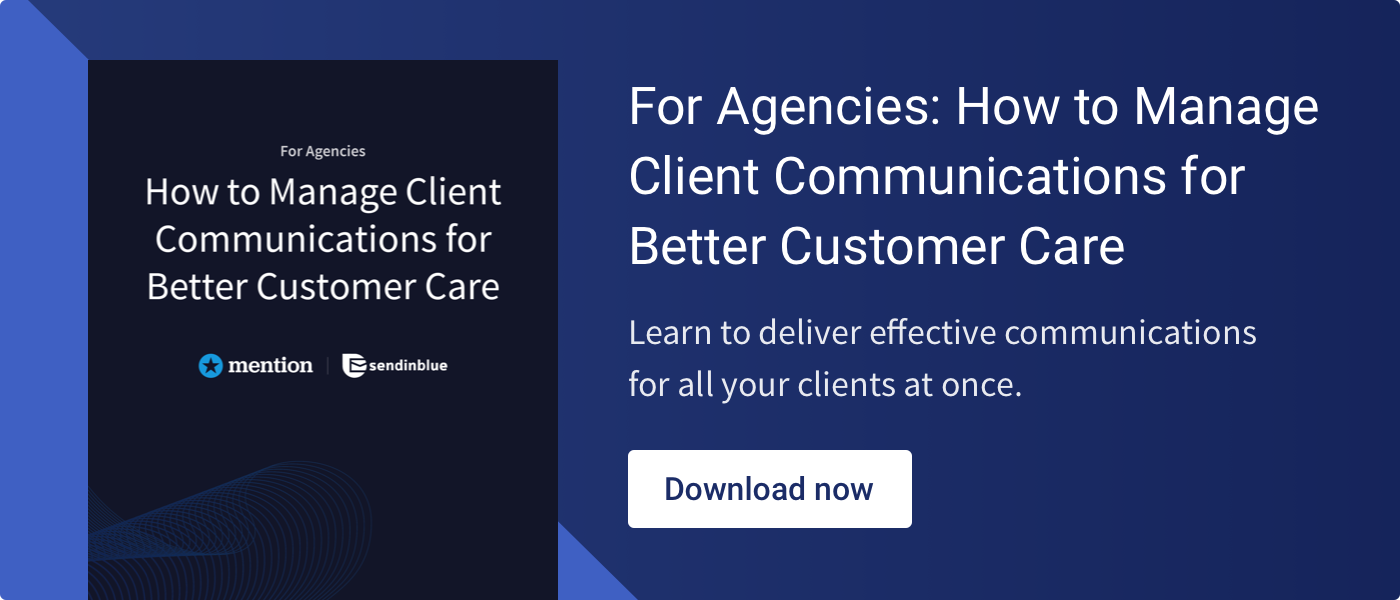We’ve talked about a few classic agency challenges before. We now that juggling handfuls of clients is a struggle, reporting is a nightmare, and meeting clients’ rigorous demands never gets easier.
But one issue affects your agency’s bottom line even more directly: how can you sign bigger clients, more often?
I can’t solve that problem for you – it really depends on the quality of your service. But in speaking with a several successful agencies, one thing became clear. Clients need to monitor their brand online, and many want an agency to do this for them.
Don’t believe me? Good, you shouldn’t. So I asked one of those agencies to explain how media monitoring helps, in their own words.
1. Offer new services
Domino Internet is a boutique agency specialized in web hosting, website design, search engine optimization, and Google Adwords. For awhile, that was their bread and butter.
But in 2017, they chose to widen the net, and start offering media monitoring and crisis management to prospects. “Our expertise is in web development,” explains Director José Delgado. “But we wanted to provide more services to our current clients, and also to try to attract new and bigger clients.”

“We realized that providing services related to social networks and content could work. Some clients don’t only want us to create content for them, or help them with SEO, but they actually wanted to go further into social networking and analyzing what was going on with their brand.”
Not every agency wants to add a whole new service to their stack. But for Domino Internet – a three-person agency – this opens them up to a whole new range of clients.
After testing more than 20 media monitoring tools, they identified Mention as the tool of choice. “We valued Mention as top of the list. Our client came back to us quickly saying they wanted to move forward with Mention, and with our agency.”
2. Sign bigger clients
As mentioned above, media monitoring is an important service that many clients need. Only, not many actually know what it is, or how to do it. Just that they need it.
For a small web agency like Domino Internet, adding this service made them more appealing to large companies with big budgets.
“It’s helping us to open many doors that we never had access to. Huge companies. As a tiny agency with three people, we were only working with small companies. To be honest, I didn’t expect to get calls from the companies we’re getting calls from. They’re saying “‘please come in and meet us next week.’”
So how do they approach these companies? It starts with the right pitch.
“We like surprising them with a little study of their own brand. As soon as you show them something, they see exactly what this tool is for.” Global marketing agency McCann uses the same approach, to help prove their value to the client during the pitch process.
One particular instance stands out for José. “We did one of these pre-meeting studies for a client that wanted to know how good the information from Mention would be. So we analyzed them against a list of sensitive words like ‘bad,’ ‘broken,’ ‘rotten,’ etc. After an hour, we found a tweet from a customer saying that he had found a pigeon feather inside a can of tuna. This client is a food manufacturer, so we opened our presentation with that. We said ‘this is what Mention is for.’ They didn’t want to see anything else.”
This demonstration is especially impressive for “traditional” clients. Those old school companies that may not have kept up with the times. When you show them how their customers behave, and how their own processes may be outdated, your pitch can have a massive impact.
“It was breathtaking. I could show them that this is how the world works now. People don’t call your 1800 number. They don’t send an email. They post an image with a hashtag for the big news channels and massive media companies. We told them ‘this could happen to your tomorrow,’ and we signed them right away. That was actually our first experience with Mention.”
3. Help clients manage crises
In addition to adding offering media monitoring, Domino Internet can now help clients avoid online crises. They watch for negative comments about clients so that they can respond quickly and avoid serious harm.
“This is something that our client really wanted to know – if there were any problems. They not only wanted to improve their social media marketing, they also wanted to have the best possible communication with their customers in case of a crisis.”
The method is simple: monitor conversations about their clients online, and pay particular attention to negative or harmful messages. The pigeon feather example above is a great example.
As soon as they notice a complaint, they can inform the client immediately and provide advice. But unlike a full-time communications agency, Domino Internet still lets the client keep control of the message. “We provide our clients access to the tool and help them to set up their reports, but they handle their information.
“The general policy about how to communicate will depend on the company. Only they know the precise words that will suit their brand at the precise moment. So it doesn’t make sense for us to handle it for them. It makes more sense that they have hands-on access to their Mention account so that they can react quickly.”
This approach only works with tools that are trustworthy. For Domino Internet, this is not a problem. “It’s really well balanced with tools and features to help you and your company find harmful conversations. Mention is always pushing in both directions: marketing and crisis management.
4. Give hands-on access to clients
It’s not only in times of crisis that they prefer to let the client keep control. The business model is to help with set up and lend guidance, but to let the client handle their media monitoring directly.
“Financially, it’s too expensive for some of them to have us on call 24/7. So instead, we just give them access. We stay close to them as a resource, and we help them set up and maintain their Mention account. We meet every three months to show them any new features, and to show new staff how to use the tool.”
This approach is both cheaper for the client, and lets them keep control of their digital marketing. Plus, it reduces the burden on the agency. For boutique shops with a range of clients, it’s a win/win.
One reason this works is that Mention stays flexible and lets agencies determine their own service. Some agencies prefer to be completely hands-on, and just provide updates to their client. Others prefer to act more as consultants, like in this case.
“With Mention, the price reflects the work we do. When we sign a new client, we need more mentions. So we pay more as we earn more. I’m very happy with that. Other companies were not happy to be flexible like that.”
A comprehensive media monitoring strategy for agencies
This is just one approach to adding a media monitoring service to your shop. We work with a lot of agencies, and some of them do things completely differently. The key thing is providing the right service to your clients, and ensuring you have the flexibility from your monitoring tool to allow that.
So why did José choose to work with Mention?
“For any prospect new to media monitoring, this is a “wow” product. It will leave their mouth hanging open. We’ve seen that reaction from clients, and that was when we realized we needed to include it in our services.”
“I would recommend Mention to any agency that wants a product that’s attractive, easy to use, effective (it provides what it says), and will therefore make you look smart to your clients. It provides a hell of a lot of information in a simple way. It’s beautiful to look at.”
Learn how your agency can add media monitoring to its services:
Subscribe to Marketing + Monitoring Weekly
Get hot blog posts, insanely useful resources, and funny gifs every Friday.

